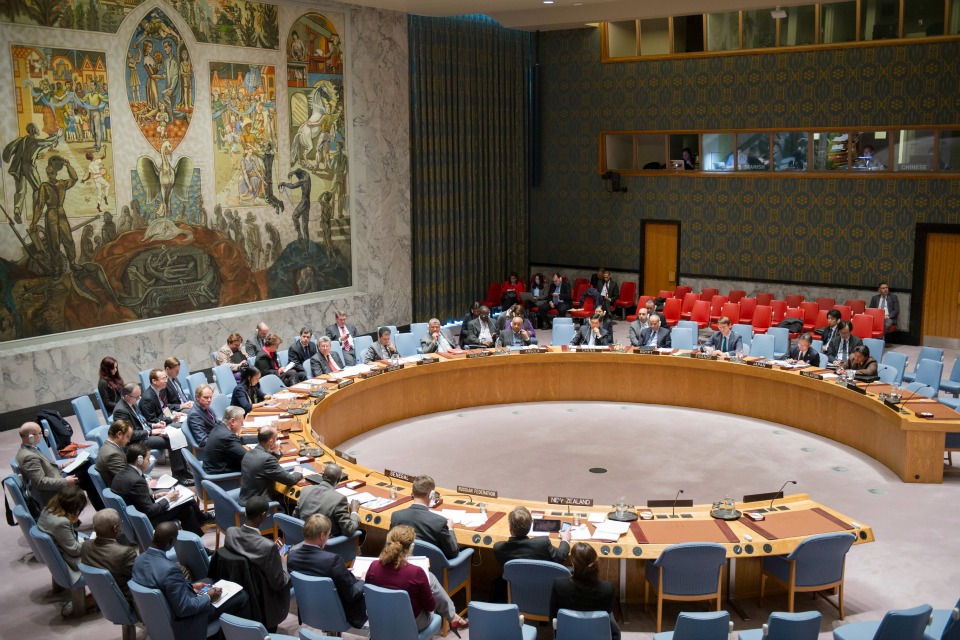"We should make sanctions as easy to implement as possible.
Statement by Ambassador Matthew Rycroft of the UK Mission to the UN at the Security Council Debate on Working Methods (Sanctions)

Thank you Mr President for convening this debate. I welcome the comments from the Representatives of Sweden and Chile.
As we have heard today, sanctions are a vital part of this Council’s arsenal. Together with the other tools at our disposal, they can help prevent conflict, slow the spread of weapons of mass destruction, and constrain the actions of terrorist groups.
We’ve seen them succeed across the world in response to all these threats. In countries like Sierra Leone or Angola, they played a part in establishing the peace and security that endures to this day. In countries like Iran, they helped restrict the development of nuclear weapons; an important step toward bringing Iran in from the cold. And against groups like Da’esh and Al Qaida, they are choking off funding, disrupting activity, and sending a clear message that this Council will not stand idly by in the face of their barbarism.
All these examples underscore that sanctions must be a tough measure - a measure that we won’t impose lightly or as a first resort. We do not underestimate the unintended consequences that such measures can sometimes bring, but let us recognise that the United Nations has applied lessons from the past and has worked hard to hone our approach, moving away from broad trade embargoes to now target individuals and specific sectors. We know our approach is working; no third party State has appealed to the UN for assistance with the unintended consequences of sanctions since 2003. However, there is always more to be done to improve the effectiveness of our sanctions work.
I note, Mr President, the proposals you have made in the concept note. We agree that some improvements are needed to the machinery underpinning UN sanctions.
We’ve already this morning heard several good ideas which we support, for instance on the earlier appointment of new Chairs of Sanctions Committees. And we welcome those constructive contributions to this important debate.
There is certainly scope too for more openness and transparency in the Sanctions Committees, while respecting the confidentiality of their work, not least because of the risk of asset flight by those being targeted.
We also need to make sure that any proposals for reform are in keeping with the High Level Review of UN Sanctions. We shouldn’t duplicate effort, nor try to reinvent the wheel. We welcome, and should use, the work done by Sweden and other sponsors on this issue. Their final Compendium showed that sanctions reform must be discussed in the round; including looking again at the UN sanctions machinery and how it works with other institutions, and raising awareness of sanctions within and outside of the United Nations.
The compendium also found, and I quote, that ‘effectively implemented Security Council sanctions can and do play a critical role in promoting peace and security.’ It’s those crucial words ‘effectively implemented’ that we must not lose sight of today. Any efforts to improve the openness or efficiency of the UN’s sanctions machinery will count for nothing if they don’t address how the sanctions are actually being implemented. Sanctions regimes established by this Council under Chapter VII impose legally binding obligations on all Member States, and it is absolutely crucial that all States implement them fully. This is the only way that sanctions can be effective and achieve their objectives. In particular, States who serve on Sanctions Committees must abide by the provisions set out in resolutions that govern regimes. Only through States faithfully abiding by these will we see proper implementation.
But we do recognise that implementation is often challenging, so we see scope for sharing best practice and learning lessons across all regimes. One way is through arranging meetings and visits of experts from capitals. This can contribute to the debate, through developing networks and identifying capacity gaps. Sharing information on challenges to effective implementation, sharing best practice will help Member States in their own implementation. And assistance on implementation should be made available to those currently unable to comply.
In short, we should make sanctions as easy to implement as possible. This includes making it easier for businesses, and we welcome the call in resolution 2253 to make progress on an enhanced data model for the UN Da’esh and Al-Qaida sanctions list. Ultimately, Mr President, to ensure that sanctions remain an effective, long-term part of our toolbox, we need to use them in the most appropriate, and most effective manner.
Our mandate is clear, it comes from Article 41 of our Charter. To succeed in this effort, we need better implementation.
And with the right information at our disposal, with the right targeting, and with the right coordination, I believe sanctions will continue to encourage actors towards peaceful ends and, in doing so, they will continue to support the maintenance of international peace and security.
Thank you.